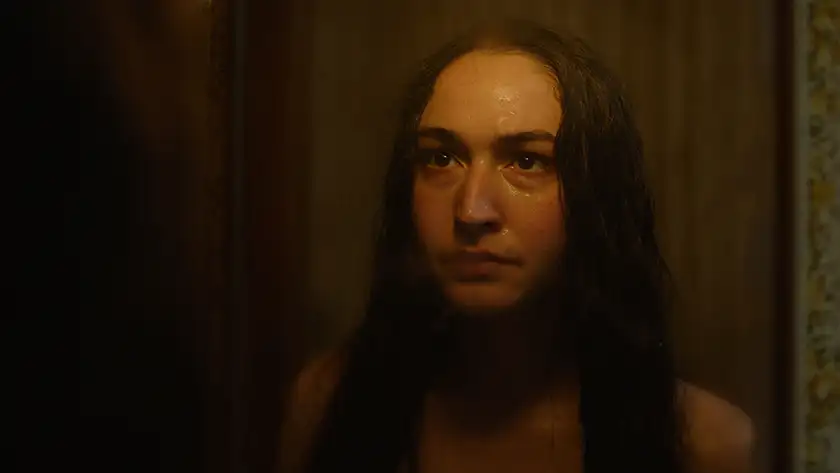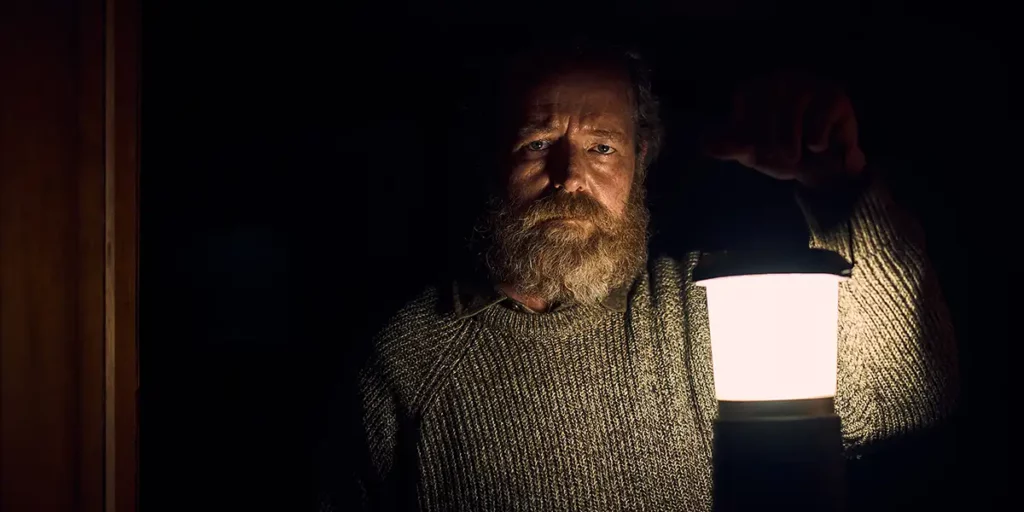Indianna Bell and Josiah Allen’s You’ll Never Find Me is a slow-burn thriller with enough style to save it from its story issues.
A core element of film that many audiences often forget about is pacing. Despite our obsession with reaching the end of things, a certain magic comes with letting us stew in our excitement and allowing ourselves to anticipate what comes next. The constant chase of our fulfilment can be exciting, but when overly catered to, it can lead to problems. While audiences may not think about pacing too much, they can certainly feel it. Whether it be slow or quick, the fashion in which you choose to present your story can be the very thing that can make or break it. Indianna Bell and Josiah Allen’s You’ll Never Find Me is a masterclass in tension that also displays the potential pitfalls and benefits of knowing your pace.
You’ll Never Find Me follows Patrick (Brendan Rock), an isolated older man living in a caravan. One night, a harsh storm rages outside, and Patrick’s lonesome life is interrupted by a young woman (Jordan Cowan) who seeks shelter. As the woman makes herself at home and learns more about Patrick, she follows a dark path where the chance to escape on this cold stormy night begins to fade.
Acting almost like an episode of The Twilight Zone blended with a hint of Alfred Hitchcock, You’ll Never Find Me is an old-school thriller built almost entirely on its script and minimal design. Here, the entire film takes place entirely in one largely mundane caravan. Those expecting elaborate action or even scares may be surprised to find that we have something a lot more subtle. The key part of You’ll Never Find Me‘s success is its stellar use of sound design. The rain and thunder from the outside are utterly incredible at ratcheting up the tension as the events of the film’s narrative unfold. In a way, it acts as a form of music, with the thunder acting like a drum to the beat of the narrative. Each moment feels finely tuned to what the story wants and how it intends to deliver it.
In addition to the sound design, You’ll Never Find Me heavily relies on its script. Once again, this is a minimal film as it uses both its characters and one-room narrative design to squeeze as much out of them as possible. Much of the first half is very dialogue-driven as we get a grip on these two characters. Patrick is a man riddled with lonely thoughts and a heartbreaking life filled with tragedy. However, it becomes immediately apparent that something else is at play. There’s a feeling from the outset that our lead character knows more about what is happening around him than the viewer does, and in that confusion, our other character enters.

We have another character filled with secrets, simply named “The Visitor”. After all, anyone approaching a stranger’s house in the middle of a dark stormy night is bound to have many questions surrounding them. The slow unravelling of secrets here is an undeniable strength of You’ll Never Find Me as it wears its nail-biting influences on its sleeve.
However, as strong as the foundation of You’ll Never Find Me truly is, an unshakable feeling crops up in the third act that much of what is here is strong on a surface level but offers little else beyond that. With a runtime of around 98 minutes, the film presents itself at a glacial pace. Now, as someone who is very much into these one-room thrillers, I am more than happy to take the time to breathe in a film’s atmospheric and personal space. However, the sheer amount of time You’ll Never Find Me takes to get to its conclusion leads to a lot of meandering and an unusual pace to how it unravels. We understand from the outset that our lead character is strange and potentially dangerous, and by the end, it mostly follows the path you’d expect it to follow.
Despite these story issues, an undeniable style shines in Indianna Bell & Josiah Allen’s excellent direction and use of tension within You’ll Never Find Me. The use of light and the claustrophobic shot composition are masterful at making you feel like another participant in the film’s narrative events. Every single moment here feels meticulously thought out, and every visual beat is placed together like a symphony. As the third act lets the filmmakers up the intensity and perform many of their flashy directorial tricks, it becomes clear that You’ll Never Find Me is a thriller made out of love even despite the core problems at play.
The story may leave a little to be desired, but on a visual and technical level, there’s an exhilarating energy here that independent thrillers with similar ideas struggle to articulate. You’ll Never Find Me is a dark journey worth exploring, even with its flaws. Tension is a tricky skill to master, but here, there’s a strong foundation for these filmmakers to improve upon in the future.
You’ll Never Find Me will be streaming on Shudder from March 22, 2024.

